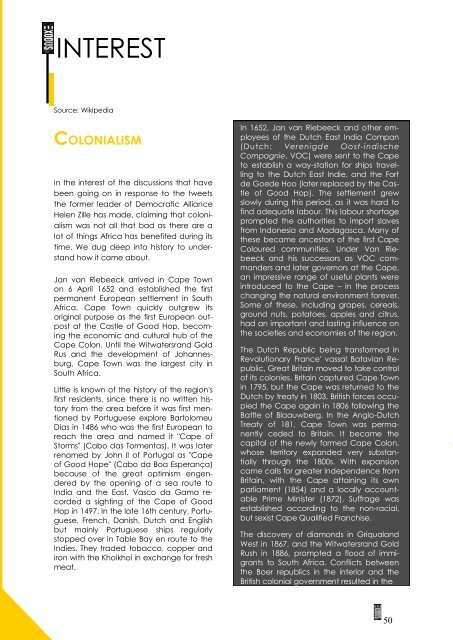ExodusMagApril2017
You also want an ePaper? Increase the reach of your titles
YUMPU automatically turns print PDFs into web optimized ePapers that Google loves.
INTEREST<br />
Source: Wikipedia<br />
COLONIALISM<br />
In the interest of the discussions that have<br />
been going on in response to the tweets<br />
the former leader of Democratic Alliance<br />
Helen Zille has made, claiming that colonialism<br />
was not all that bad as there are a<br />
lot of things Africa has benefited during its<br />
time. We dug deep into history to understand<br />
how it came about.<br />
Jan van Riebeeck arrived in Cape Town<br />
on 6 April 1652 and established the first<br />
permanent European settlement in South<br />
Africa. Cape Town quickly outgrew its<br />
original purpose as the first European outpost<br />
at the Castle of Good Hop, becoming<br />
the economic and cultural hub of the<br />
Cape Colon. Until the Witwatersrand Gold<br />
Rus and the development of Johannesburg,<br />
Cape Town was the largest city in<br />
South Africa.<br />
Little is known of the history of the region's<br />
first residents, since there is no written history<br />
from the area before it was first mentioned<br />
by Portuguese explore Bartolomeu<br />
Dias in 1486 who was the first European to<br />
reach the area and named it "Cape of<br />
Storms" (Cabo das Tormentas). It was later<br />
renamed by John II of Portugal as "Cape<br />
of Good Hope" (Cabo da Boa Esperança)<br />
because of the great optimism engendered<br />
by the opening of a sea route to<br />
India and the East. Vasco da Gama recorded<br />
a sighting of the Cape of Good<br />
Hop in 1497. In the late 16th century, Portuguese,<br />
French, Danish, Dutch and English<br />
but mainly Portuguese ships regularly<br />
stopped over in Table Bay en route to the<br />
Indies. They traded tobacco, copper and<br />
iron with the Khoikhoi in exchange for fresh<br />
meat.<br />
In 1652, Jan van Riebeeck and other employees<br />
of the Dutch East India Compan<br />
(Dutch: Verenigde Oost-indische<br />
Compagnie, VOC) were sent to the Cape<br />
to establish a way-station for ships travelling<br />
to the Dutch East Indie, and the Fort<br />
de Goede Hoo (later replaced by the Castle<br />
of Good Hop). The settlement grew<br />
slowly during this period, as it was hard to<br />
find adequate labour. This labour shortage<br />
prompted the authorities to import slaves<br />
from Indonesia and Madagasca. Many of<br />
these became ancestors of the first Cape<br />
Coloured communities. Under Van Riebeeck<br />
and his successors as VOC commanders<br />
and later governors at the Cape,<br />
an impressive range of useful plants were<br />
introduced to the Cape – in the process<br />
changing the natural environment forever.<br />
Some of these, including grapes, cereals,<br />
ground nuts, potatoes, apples and citrus,<br />
had an important and lasting influence on<br />
the societies and economies of the region.<br />
The Dutch Republic being transformed in<br />
Revolutionary France' vassal Batavian Republic,<br />
Great Britain moved to take control<br />
of its colonies. Britain captured Cape Town<br />
in 1795, but the Cape was returned to the<br />
Dutch by treaty in 1803. British forces occupied<br />
the Cape again in 1806 following the<br />
Battle of Blaauwberg. In the Anglo-Dutch<br />
Treaty of 181, Cape Town was permanently<br />
ceded to Britain. It became the<br />
capital of the newly formed Cape Colon,<br />
whose territory expanded very substantially<br />
through the 1800s. With expansion<br />
came calls for greater independence from<br />
Britain, with the Cape attaining its own<br />
parliament (1854) and a locally accountable<br />
Prime Minister (1872). Suffrage was<br />
established according to the non-racial,<br />
but sexist Cape Qualified Franchise.<br />
The discovery of diamonds in Griqualand<br />
West in 1867, and the Witwatersrand Gold<br />
Rush in 1886, prompted a flood of immigrants<br />
to South Africa. Conflicts between<br />
the Boer republics in the interior and the<br />
British colonial government resulted in the<br />
50















